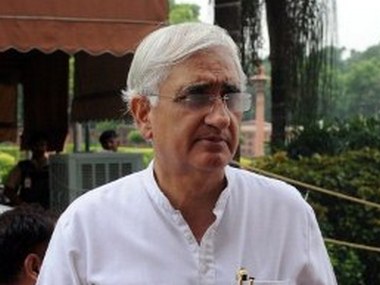Two differing voices were heard on Monday, and both had worries about the same thing. Law Minister Salman Khurshid feared that if the judiciary were immune to society, and businessmen were to be locked up, the consequences would be a slowing down of investment.
The other voice came from an open letter to ‘our leaders’ from leaders of the business community, including former judges, in which they pointed out why “several impediments” - including corruption - were putting the brakes on any possible flow of investments.
The startling thing, apart from the coincidence of the two voices being heard the same day, was this: while the business leaders took a sweeping view of the country’s problems, the minister took a limited view. While the business leaders had a lament, the minister’s view, coming from the establishment, is cause for anxiety.
[caption id=“attachment_104553” align=“alignleft” width=“380” caption=“Law Minister Salman Khurshid. AFP”]
 [/caption]
[/caption]
Khurshid is clear. The business class has to be pampered, their indiscretions have to be tolerated because they bring in the money. He fails to grapple with the fact that despairing businessmen, despite their past tango with corruption, would probably prefer to operate in a graft-free environment. But it is for the political class to ensure such an ambiance.
Reading closely, Khurshid’s view reflects the agony of the ruling elite that it could not have its way and that it was being barred from doing business in the usual manner. This articulated anxiety ought not to be taken in isolation but seen along with the earlier fears that the Right to Information Act was a serious hurdle to conducting the affairs of the government.
Corporate Affairs Minister Veerappa Moily had conceded that the RTI was “no doubt an instrument of empowerment” of the people, but at the same time, it was impinging on governance. Put together, the Khurshid and Moily stands point to the fact that the government wants to operate behind an opaque screen and even the judiciary ought not to upset the establishment’s apple cart.
This is dangerous. Governance does not merely mean getting policies crafted, budgets approved, schemes laid, and then leave it to be shoddily delivered at the recipients’ end. What happens between the policy formulation and its delivery is what governance is all about. It is not an abstract to which any meaning could be attributed, especially those which are convenient to the ruling class.
What the government seems to be suggesting is that doing business at the top, by ganging up with other vested interests and classes, is more important than the overall interests of the people.
Take crony capitalism. The establishment thrives on this and businessmen have no complaints - unless they get the short end of the stick. The business leaders who wrote the letter make no bones about their opposition to crony capitalism.
Corruption is another bugbear. The payer and the receiver of bribes have no complaints because the chai-pani and baksheesh regime of the past has been converted into a systemic arrangement where political and bureaucratic offices are the means to rake in the moolah.
Of course, Anna Hazare is an inconvenience. He will have to be slowly eased out by offering grand laws and not using them. Any law is only as good as its implementation, and a Lokpal law, if used in a half-hearted manner, can be converted to a dud like many others. Going by laws and rules alone, one would imagine that this is a great country where everyone sticks to the straight and narrow.
But that is not how it is. Laws have been made not to benefit the common man, though they are made in his name, but to flaunt them and use them for collateral purposes. Hazare has spoken on the public’s behalf. This is why he upsets the sang froid of the khadi clad and the business suits brigade - with a few exceptions.
The other dangerous element in what Khurshid said is the ’leave us be’ attitude, which means the people and the courts have no right to intervene because the elected political class is ordained to be repositories of all wisdom - for the good of the country. Never mind that the definition of “good” may be decided by the political class’ own interests rather than the people.
Having been hurt by the huge Anna Hazare agitation that is taking more direct action by denying the vote to reckless politicians if they do not subserve public interests, the politician, instead of running for cover, is only keen on bludgeoning people who stand in his way.
It should not be surprising if the two views generate a huge public debate. There needs to be some check on the self-righteousness of the political class. If that does not happen, we are in a moral crisis where indignation is manifest only on Twitter, Facebook and on blogs and Ramlila Maidan - and nowhere else.
Mahesh Vijapurkar likes to take a worm’s eye-view of issues – that is, from the common man’s perspective. He was a journalist with The Indian Express and then The Hindu and now potters around with human development and urban issues.
)